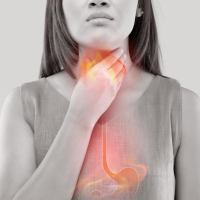
Researchers from Japan have completed a Cochrane review which explores whether proton pump inhibitors (PPIs) are effective in (a) reducing chronic obstructive pulmonary disease (COPD) exacerbations, and (b) improving quality of life for people with COPD.
The team found only one study, with 103 participants. This study showed that giving PPIs to people with COPD may reduce the frequency of COPD exacerbations. However, further high-quality studies are needed to be more certain.
What was studied in the review?
This study specifically looked at COPD. COPD is a common respiratory disease, characterized by cough with mucus and breathlessness. COPD is one of the leading causes of death worldwide, and reduces quality of life. COPD exacerbation is associated with hospitalization and death, placing a large burden on the individual, society, and the economy.
Gastroesophageal reflux disease (GERD) is one cause of COPD exacerbation. GERD is a common gastrointestinal disease caused by reflux of stomach acid into the oesophagus (food pipe) and lungs. This gives people the symptoms of heartburn and cough. When people have GERD, they are given PPIs to treat it. These work by reducing the amount of stomach acid. While PPIs are effective for treating symptoms of GERD, it is unclear whether adding PPIs to usual care reduces the frequency of COPD exacerbations or improves the quality of life for people with COPD.
What are the main results of the review?
One study was found for this review. The study was from a university hospital and three city hospitals in Japan. This study compared the effects of a PPI plus usual care against usual care alone in people with COPD who had no history or symptoms of GERD. The researchers investigated changes in the frequency of COPD exacerbations and the common cold over a 12-month period. This study used a 15 mg daily dose of a PPI called lansoprazole. There was low-certainty evidence of a reduction in the number of people on lansoprazole who had COPD exacerbations compared with people who had usual care, and very low-certainty evidence that similar numbers of people in each group had at least one common cold.
The review authors did not find any studies that described the effects of PPIs on pneumonia and serious adverse events, quality of life, lung function, or disease-specific adverse events.
Authors' conclusions
Evidence identified by this review is insufficient to determine whether treatment with PPIs is a potential option for COPD. The sample size of the included trial is small, and the evidence is low to very low-certainty. The efficacy and safety profile of PPIs for people with COPD remains uncertain. Future large-scale, high-quality studies are warranted, which investigate major clinical outcomes such as COPD exacerbation rate, serious adverse events and quality of life.
The review is current to 22 May 2020. Click here to read the full review.
